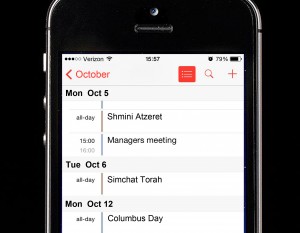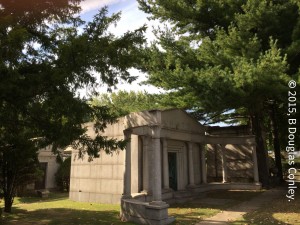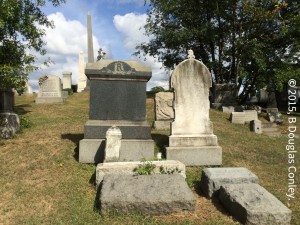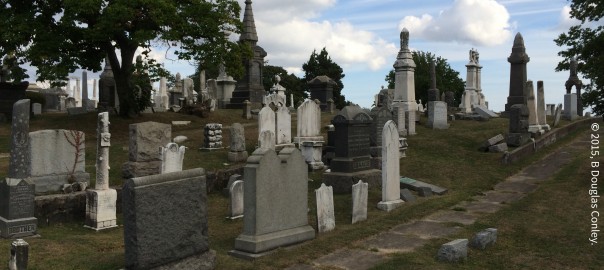“Our dead are never dead to us, until we have forgotten them.” —George Eliot, Adam Bede, 1858
Now that we are well past the most Jewish-holiday-packed months of the year, September-October, it seems a good time to examine some common misconceptions and misbehaviors by researchers in Jewish cemeteries. Whether you are Jewish or not, the traditions of Jewishness within a cemetery environment should be learned by genealogical researchers if they want to be of any assistance to their clients with Jewish ancestors.
Like all other cemeteries, Jewish cemeteries open their iron gates for the convenience of family mourners and tourists alike. We are all welcome to enter and walk among the monuments, whether or not we can read the headstones that are written in a variety of languages, with Hebrew still being the most common in use in America. Still, there is a growing number of Jewish-Russian immigrants who have the Cyrillic alphabet carved into the cemetery stones, possibly with one or more of the three most common Jewish letter sets used in America’s history: Hebrew-Aramaic, Yiddish and Ladino (Spanish-Hebrew). The most modern language, Ivrit, is the form of Hebrew used in Israel and is also beginning to show a presence here, but it has not displaced the traditions of American Jewishness, as yet.
א—ב—ג—ד—ה—י—ז— Seven Mindful Genealogical Practices —א—ב—ג—ד—ה—י—ז for Jewish Cemeteries
After a week of trekking through several old, but still open, cemeteries in Brooklyn and Queens, New York, I thought I would pass along some of the quintessential practices that a genealogist should keep in mind while doing Jewish cemetery research. These seven points are especially important for non-Jewish persons, such as myself.
א—First, know the Jewish calendar. (While the following scenario is fictional, I still feel I am just as likely as anyone to forget to look at the Jewish calendar when necessary. In self-defense, I installed an app on my phone and laptop called Hebcal.)
Let’s say you—a fictional you—does not have a clue about Jewish holidays so you call up the Jewish cemetery to see if they are open. You get an answering machine. You go down the list of contact numbers of the cemetery and on each call you get another machine. You have a pushy client and you’re behind schedule, so you email and text your query to the entire cemetery staff. When you finally speak to someone the next day you are mighty annoyed that no one contacted you the day before. When informed that the previous day was Rosh Hashana, the beginning of the High Holy Days, you ask why that fact wasn’t clearly stated on the website or answering machine. (Oy…what…a…nudge.)
Here’s where fictional you went very wrong. Jewish holidays, my imaginary friend, need no announcement in the Jewish world or anywhere else, except among the ambivalently Jewish, perhaps. If a non-member of a Christian church were to call the church during the four weeks of Advent in December with questions not related to Advent services at the church, how soon should they expect a call back? Better yet, how is any non-member of any institution going to know about events before they happen? The answer is the same for everyone—they get a calendar.

This is my phone calendar with the major Jewish holidays provided by my free, favorite calendar app, called Hebcal.
With a Jewish calendar in hand you can plan your cemetery research. One look at the Jewish calendar and you will realize there are several months where there are few, if any, holidays. Make those your target months for contacting Jewish institutions, just as you may avoid December and two weeks in April for contacting Christian churches or May through July and one day in the fall for Muslim mosques. As for Hindu temples, due to their nearly year-round holiday schedule, you should probably call them to find out when they have days off. Likewise, for any religious order, you should examine their annual holiday schedule before arriving at a cemetery unannounced. While some Jewish congregations may not answer your call quickly during holidays, if you know the right time to call, you might just get a response much sooner.
After you get a Jewish holiday app for your calendar, always refer to it first, before you promise anything to clients with Jewish ancestors. Look for the holidays I list below, which are the most important, and know that a Jewish cemetery will probably be closed on those days. The day before any of these major holidays—called “erev,” such as “erev Chanukah“—they may close early. If a holiday has multiple days, like Sukkot, it is usually the first day of the holiday that the cemetery will definitely be closed.
The Major Jewish Holidays in Order of Occurrence
| Hebrew | Yiddish | Ladino | Gregorian Calendar |
|---|---|---|---|
| Rosh Hashana | Rosh hashone | Rosh Hashanah | (Sep-Oct) |
| Yom Kippur | Yinkiper | Yom Kippur | (Sep-Oct) |
| Sukkot | Sukes | Sukkot | (Sep-Oct) |
| Shimini Atzeret | Shimini Atzeres | Shimini Atzeret | (Sep-Oct) |
| Simchat Torah | Simkhes toyre | Simchat Torah | (Oct) |
| Chanukah | Khanuke | Chanukah | (Dec) |
| Purim | Purim | Purim | (Feb-Mar) |
| Pesach | Peysekh | Pesaj | (Mar-Apr) |
| Shavuot | Shavuos | Shavuot | (May-Jun) |
| Tish'a B'Av | Tish'a B'Av | Tish'a B'Av | (Jul-Aug) |
ב—Second, respect the congregation(s) who own the cemetery.
The congregation may be your only connection to the index of burials at the cemetery which may be your only access to the vital records of the deceased. So, find out the name of the person who is responsible for the cemetery index at the congregation either online or with a call to the office manager at the congregation. Be sure to check your Jewish calendar before you call. The office manager will forward you to the person with the cemetery index and If you feel comfortable with doing so, always wish them to “have a good holiday” when you greet them at the beginning of the call and when you end the call. You can say something like, “Thank you again Rose for all the help with your index and have a good holiday next week.” Nothing fancy. It just shows that you are not clueless.
Remember, every congregation in America has a history. Some, mostly in the areas of significant Jewish immigration, are as old or older than the United States. Jewish persons who arrived in America prior to the onset of WWII left behind a world where beautiful temples and cemeteries had existed for centuries. To come to America, many times with no choice, to start again in tiny plain buildings with a tiny trash-strewn lot for burials, as Jewish colonials in New York did in 1654, was a shock that takes many generations to fade, if at all. As successful as many Jewish Americans have been, the older cemeteries, which were a triumph at their genesis, now sorely lack funding and are targets for demoralizing acts of vandalism, not to mention the ravages of nature and time.

The crypt of the Matz family in one of the better tended sections of Shearith Israel section of Beth Olam Cemetery.

In contrast, large portions of the same Shearith Israel section have had gravestones toppled by either age or vandals.
Due to these vulnerabilities, many congregations are cautious about providing the personal details of their congregations. Do not take offense. With patience and respect, offer to fax to the congregation an approval for the release of family information signed by your Jewish clients or their descendants to ease any apprehensions the congregation may feel. Sure, you could skip the approval and go gravestone to gravestone to find your deceased person, but then your client may not be able to afford such an undertaking. If you remain patient and respectful, you can expect the same in return, even if you cannot view the original index records yourself. Some non-sectarian cemeteries, like Cypress Hills in Brooklyn, have Jewish sections and allow you to read the original internment ledgers—if you ask politely.
BEWARE: Easily half the information online about how to contact some of the older and smaller Jewish cemeteries is very old, even pre-internet, and no longer accurate. This includes some information found on well-known sites, such as findagrave.com, Jewishgen.org, ancestry.com. and familysearch.org. So, you will need to plan ahead and call or email to confirm the details.
—B (Continued in my next post…)
